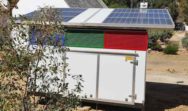
The local authorities in Cape Town, South Africa face a power crisis as electricity theft, unpaid bills and switching to renewable energy puts pressure on the electricity companies. Even though the economy and population has grown, the city expects to sell far less electricity than it has since 2006.
Solar electricity panels are appearing on rooftops all over the cities of South Africa, leaving municipalities from Thembelihle in the Northern Cape to Mantsopa in the Eastern Free State in trouble – and it is getting worse.
Leslie Rencontre, Director of Electricity in Cape Town explained the increase in prices to the National Energy Regulator of South Africa (NERSA) last week: “Where you see a decrease in electricity sales, which we are seeing because of high prices and the introduction of renewable energy, the increase in the electricity tariff has to take that into account.”
As new data confirmed last week, municipalities around the country rely heavily on the profit they get from reselling mostly Eskom power to their towns and cities. In Johannesburg about half of the city´s prepaid electricity boxes claim that the households have used no electricity. It is thought that people have stopped paying for electricity due to the higher prices.
– We are facing massive bypassing of meters and sabotaging of meters, Quentin Green, acting Chief Executive of the Johannesburg agency, City Power, told NERSA.
He explains that between the revenue loss of such illegal connections and the need for maintenance, some of it caused by the load from those illegal connections, they cannot sustain the business.
For most local governments, about a third of their revenues come from electricity sales, where the money is put into other vital services such as roads.
As the price of electricity increases, so does the number of people who choose to live off the grid and use solar power to get electricity instead. These small electricity storage solutions are becoming more and more attractive, but this can eat to absurdities.
– One of the key threats we discussed with NERSA previously is that we were finding higher-end households were able to reduce their electricity consumption and were then accessing subsidies aimed at the indigent, Rencontre said, referring to packages intended to make more electricity accessible for the poorest of the poor.
Cape Town, Johannesburg and a dozen other municipal areas have appeared before NERSA to demand and beg to be allowed to increase the amount they charge residents for electricity. In terms of NERSAs guideline local authorities can increase their prices by about 2 per cent, but must get permission for anything above that. Last week municipalities askes for a hike of more than 20 per cent for business customers.
– We really hope and believe that NERSA will look favourably on this application,” David McThomas, a manager for the Breede Valley district in the Western Cape said.
In desperation different municipalities are trying to find a solution to the problem. In Renosterberg it proposed a 12 per cent increase in electricity prices, but the citizens, 60 per cent of whom are formally in the indigent bracket said they were not going to be able to afford that. The municipality decided to apply for a 6.4 percent increase instead. Johannesburg hopes to thwart electricity theft with a new generation of smart prepaid meters, and in Msukaligwa the council hopes to uncover fraud on prepaid electricity by auditing meters with strange buying patterns.
As the municipalities hope to lessen the power crisis they aim to achieve zero theft to fix the economic problems they are facing, but there is no reason to expect anything other than an accelerating move away from the grid as prices for solar panels keep dropping. Various municipalities have proposed fees that can be levied in return for the rich maintaining but not using their connections to the grid for when their private batteries run low. Yet such charges, they admit, only create an incentive to aim for an entirely off-the-grid home or business.
In the meantime, NERSA is due to announce its decision on the individual municipality´s applications for increases in the coming weeks.
Also see: Is rooftop solar a challenge to power companies?
Auto Amazon Links: No products found.
